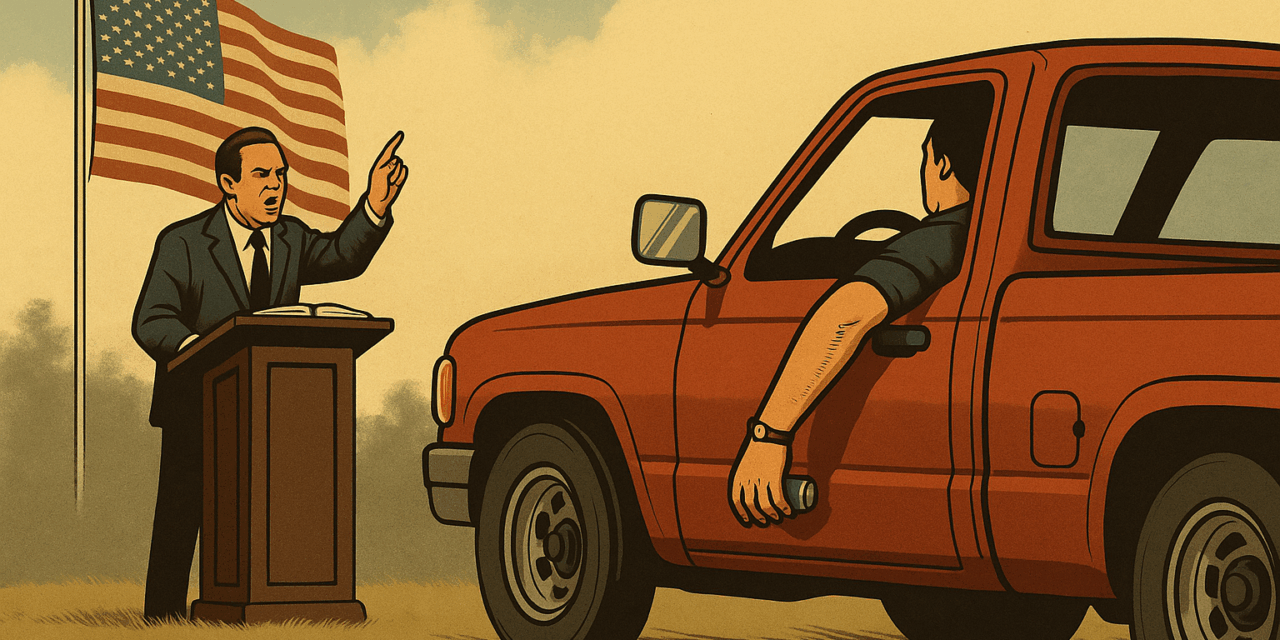It’s 5:30 a.m. on a cool, foggy morning in the heart of Bible Belt America. A man groans as he stands up from tying his work boots. His back is killin’ him — same as always. The two Ibuprofen he swallowed with his black coffee haven’t touched it yet. He climbs into his truck, fires it up, and hits the familiar gravel road leading out to the highway.
It’s the same path he’s taken for years — same one his dad took before him, heading out early to trade strength and sweat for a paycheck. The routine runs deep. The cycle continues.
By most standards, he’s a good man.
Sure, maybe he drank a little too much last night, spent too long sitting in the garage with the radio on and the door cracked. But who doesn’t need to blow off a little steam after a long day?
He hasn’t been to church in years, he just doesn’t have time or the desire. At least not a church building. His church is his secret fishing hole or his deer stand.
But by the world’s standards, he is a good, Christian man.
He works hard and doesn’t quit. He shows up on time, works all the overtime he can, and fixes what’s broken. He puts food on the table and keeps the lights on.
He’s the welder, the mechanic, the lineman, the factory worker. The kind of man this country quietly depends on — blue-collar, working-class, no-nonsense. A man raised to believe that if you work hard, respect your elders, and believe in “the Man Upstairs,” you’ll be alright.
He abides by what his father taught him; what a man is.
He’s generally conservative.He loves his country. He even believes in “Jesus”.
He passes the rites of manhood onto his son—“work hard, show respect, protect women” (but you of course don’t have to marry them before you ogle or sleep with them, that’s what guys do).
Sometimes on these rides to work he reflects on his life, the things he’s done, the partying, the friends, the trouble they got into. He looks fondly back on the memories, but sometimes he senses a small nagging in his heart about it.
“Hey man, what guy hasn’t done it?”, he tells himself. “God understands”.
When he was a young boy, he went to church often. More for the free cookies and play time in Sunday school than anything. His grandma who took him actually read and believed her Bible, so he’s good riding into heaven on her spiritual coat tails.
He even prays sometimes to this “Jesus” he has crafted in his mind over the years. Not the one that holds you accountable for sin, the star-spangled, Bible Belt version who is basically a white, middle-eastern hippie that just loves everyone and everything and has no job other than to make us happy.
Ticket punched.
Still, his conscience nags at him from time to time, though it is today more seared than Trump’s $1,000 ketchup-slathered steak.
He rolls his bloodshot eyes at the thought of the “Jesus freak” guy at work who keeps inviting him to church, cranks up the radio to get his mind off of it, his favorite Jelly Roll song comes on—ah, conscience pacified.
“I guess there’s just some things you just can’t outrun
There ain’t no back pew in this truck, so I’m forced to sit in the front
And ain’t it funny how He’s working in mysterious ways?
H***, I skipped my share of sermons, so He brought one to this Chevrolet”
The “Christian man” sings through the truck speakers, validating the man’s justifications.
Anywhere and anything is “your church”. “Jesus” is a name tag to stick on whatever 1st commandment violation that floats your boat. And “Christian” is a title for anyone who says the sacred name.
These lyrics are not bad theology, per se — they’re honest confessions of spiritual emptiness. But without repentance and faith, they’re just psalms of the damned.
They show that many modern men know something’s wrong, but they don’t want the real Jesus — the one who demands they die to themselves.
I am not saying that if you are a Christian, you cannot enjoy Jelly Roll’s music. You have liberty in Christ brother, but please be wise with what you are allowing into your eyes and ears.
If you listen to Jelly Roll, that does not mean you are not a Christian, but it also does not mean you are one.
There are many faithful saints living in the Bible Belt today, but just because you live there, does not mean you are one of them.
The question is, what does it mean to be a Christian?
Is simply saying you believe in Jesus and then living your life as you please enough to save your soul from eternal damnation?
The modern American ethos, at least from a working-class conservative standpoint, tries to hang onto a Christian identity.
But what does that really mean?
The First Great Awakening
At one time our great nation was decidedly Christian, with the efforts and convictions of groups like the Puritans, the Huguenots, the Congregationalists, and Baptists of old.
They didn’t just wear t-shirts that said “faith, family, freedom”, they lived those principles and shaped our cultural identity.
But this gave way to much of the same problem we see in the Bible Belt south and rural America at large—nominalism.
Still held up as one of the most intelligent men to ever walk on Uncle Sam’s soil, Jonathan Edwards noticed this problem in his time as well.
Before the Great Awakening in the mid-18th century, Edwards lamented and went to war with the cultural Christian dad of his time.
Not because he was better than him, Edwards would likely tell you the opposite was true, but because he loved him and did not want him to die and go to hell.
Though Pastor Edwards’ time obviously looked much different than today, where we see public debauchery the likes of which would make the most vile criminal of the 1700s clutch his pearls, Edwards began preaching and warring against this cultural phenomenon, where people equated going to church and saying the name Christ with punching your ticket to heaven, and you could live your life as you pleased beyond that.
Outward workings of religious fidelity were becoming very much accepted as genuine regenerate faith in the Lord Jesus Christ.
But something began to happen as Pastor Edwards served in ministry: the Spirit of God was moving mightily on our nation.
People were coming in droves to the Lord, and this was the First Great Awakening.
This is the context in which Edwards wrote his famous sermon—“Sinners in the Hands of an Angry God”.
With the fervent preaching of men like Edwards and George Whitefield, people were faced with the question—“Am I really saved?” And by His grace, were feeling that sweet heavenly conviction that led to repentance.
This First Great Awakening rekindled the original colonists’ and founders’ faith in Christ, which shaped our society.
It revolved around Christ-centered, gospel preaching. They spoke unashamedly of sin, God’s sovereignty, grace, and yes, the naughty word— hell.
History Repeats Itself
“What has been is what will be, and what has been done is what will be done, and there is nothing new under the sun.”
— Ecclesiastes 1:9
Next came the Second Great Awakening, which occurred in the late 18th–early 19th centuries, and eventually gave birth to the modern Bible Belt brand of nominalism.
The Second Great Awakening, though certainly used by God, focused more on experiential methods. This is where your big tent revival and altar calls came about, which deeply impacted the South and rural areas of America.
They were seeing mass amounts of conversion, people feeling led to give their life to the Lord, with little fruit to show for it a year later. This became the norm, and this is where the ideology of—“I went to church when I was a kid and therefore I am now saved”—took hold.
It came full circle.
The very thing that motivated and convicted men like Jonathan Edwards, who grieved the nominalist culture of his day, resulted in it happening again.
And as the wisest man who ever lived (besides Jesus Christ, obviously) said, “what has been done is what will be done“— here we are yet again.
The Second Great Awakening made straight the path of nominalist ticket-punching like we see in the Bible Belt culture, our blue-collar dad finds himself in today. Where the Jelly Rolls of the world make millions, applying hickory-smoke-and-bourbon scented salve to the conscience of many lost souls.
We are not unique; we see the same thing happening all throughout the Old Testament with God’s covenant people. We look back today on the record of Israel’s vacillating between fidelity to God and then immediately turning around to scurry away to the false gods in the blink of an eye.
We think, “How could they be so foolish? So quick to wander from the God they love?“
My friend, what makes us any different? Look around you.
It is not canon, but certainly rings true—
“Hard times create strong men. Strong men create good times. Good times create weak men. And, weak men create hard times.”
G. Michael Hopf, Those who remain
I Never Knew You
Our Bible Belt friend might be the most rugged, grizzled, tough guy on the face of the earth.
But spiritually, he is as soft as a Jelly Roll.
It would be far better for him to rip off the mask, admit his lostness, and deal honestly with the God he’s been pretending to know.
But the deceiver is clever. He doesn’t show up with horns and pitchforks. He wears a cross necklace and sings about the woods being the only church you need.
The Apostle Paul gives a sobering exhortation to the Corinthian church. Corinth was a gritty port city; it was mostly made up of rough, blue-collar dock workers, ex-military men, brothels, and bars. The Corinthians were the type of people who’d feel right at home in a smoke-filled VFW or a local bar off the side of a two-lane highway in small-town America on a Friday night.
Paul said this ti them (italics added):
“Examine yourselves, to see whether you are in the faith. Test yourselves. Or do you not realize this about yourselves, that Jesus Christ is in you? — unless indeed you fail to meet the test!”
— 2 Corinthians 13:5
Jesus Christ gives a heart-wrenching warning to the crowd in His Sermon on the Mount. He says this to them:
“Not everyone who says to me, ‘Lord, Lord,’ will enter the kingdom of heaven, but the one who does the will of my Father who is in heaven.
On that day many will say to me, ‘Lord, Lord, did we not prophesy in your name, and cast out demons in your name, and do many mighty works in your name?’
And then will I declare to them, ‘I never knew you; depart from me, you workers of lawlessness.’”
—Matthew 7:21–23
Absolutely terrifying words from the one who we all will give an account to at the end of our life.
Not a few— many will say to Him, “Lord, Lord“. As if they knew Him all along, giving him lip service. How does He respond? “I never knew you; depart from me, you workers of lawlessness.”
Those are the final words many will hear on that day, as they are being cast down into hell for eternity. They acted like they knew Him, they even did mighty works in His name, but their hearts were far from Him.
In what is possibly the ‘Sinners in the Hands of an Angry God‘ of our time, Paul Washer said this in a very famous sermon he gave called ‘The Shocking Youth Message‘:
It is impossible, Brother Paul, to have an encounter with something as large as a logging truck and not be changed. And then my question would be to you. What is larger, a logging truck or God? How is it that so many people today profess to have had an encounter with Jesus Christ, and yet they are not permanently changed?
The setup was this: if he were late to preach that day, and he got up there and gave the excuse that he got hit by a logging truck head-on going 75 miles per hour, but yet appeared totally unchanged, you would call him a lunatic or a liar.
What is larger, a logging truck or God?
We are not saved by our works. We are not saved by going to church. We are saved by being honest with ourselves and God and bringing the mountains of sin we have in our lives to a bloody Roman cross and laying it all at the feet of our risen Lord who died to pay for them.
And if we have done that and are saved, we will be obviously different from the world, and our works will evidence that.
What are you waiting for? You have years of partying, manual labor, and bad dieting under your belt, just like me. It could be any moment that you stand before Christ, and like so many others proclaim ‘Lord, Lord’, just to hear those final words in the end.
You say you believe in God, so do the demons, and they tremble at the fact (James 2:19). The demons believe in God with 100% certainty, but without faith and repentance, it does them no good.
The demons believe, what makes you different than them?
I asked a question at the beginning of this article: ‘is simply saying you believe in Jesus and then living your life as you please enough to save your soul from eternal damnation?’
Many will say they did when they stand before Christ, and that profession will be tested.
“22 But be doers of the word, and not hearers only, deceiving yourselves. 23 For if anyone is a hearer of the word and not a doer, he is like a man who looks intently at his natural face in a mirror. 24 For he looks at himself and goes away and at once forgets what he was like.” — James 1:22-24






Abolitionist…a person who favors ending slavery or capital punishment
An abolitionist is someone who advocates for the abolition of a practice or institution. I do specifically advocate for the abolition of capital punishment for innocent children in the womb.
Very well-written, Jay, and absolutely spot-on as to the state of much of modern-day Christianity, especially where I live and work — in the deep South (USA). Many of my colleagues are just as you described — Christian by virtue of their upbringing and social structure, with “conservative” political and ethical leanings that align with Christian values, but are otherwise far more interested in hunting, fishing, trucks and boats than anything remotely connected to following the lovely Jesus. In my place of business, I find some of these wearing shirts that advertise on the front, “I’m a Christian, but…” and then conclude with some as activity on the back, such as “I swear a little” or “I drink a little.” (The real problem is the “but” in that statement, by the way! I’d like to believe that for a genuine Christian it would be replaced by “and” and conclude with something that God is doing in, with or through one’s life.). Many of these “Christians” don’t understand that the new birth is transformative. Just as the Apostle Paul wrote to that crazy first-century church in Corinth, as you mentioned. When Christ moves in, he replaces the “but” with a deep desire for the “and”! But, may I add, that while your article speaks to those I see around me, it spoke to me also — as I need to reflect more deeply on the things I do, the things I say, the things I think, that have fallen into ill repute through spiritual mismanagement. Your words have stirred in me a renewed desire to follow Christ closer than before. For that I thank you!!
Robert, thank you very much for the kind words, brother. That sincerely means a lot to me that your spirit was stirred within you after reading this post. Very encouraging to hear. All glory be to Christ!
Yes, I can certainly relate to and appreciate your sentiment about the t shirts. I live in rural Ohio and work in a factory, so everyday I am surrounded by those who either are deceived into believing the false gospel of Rome (very prominent in my area of Ohio), or the “Christian but….” people. I hope that this work would reach and stir them as well. Feel welcome to share this post on social media as well, to that end.
Thank you, and God bless you, Robert!